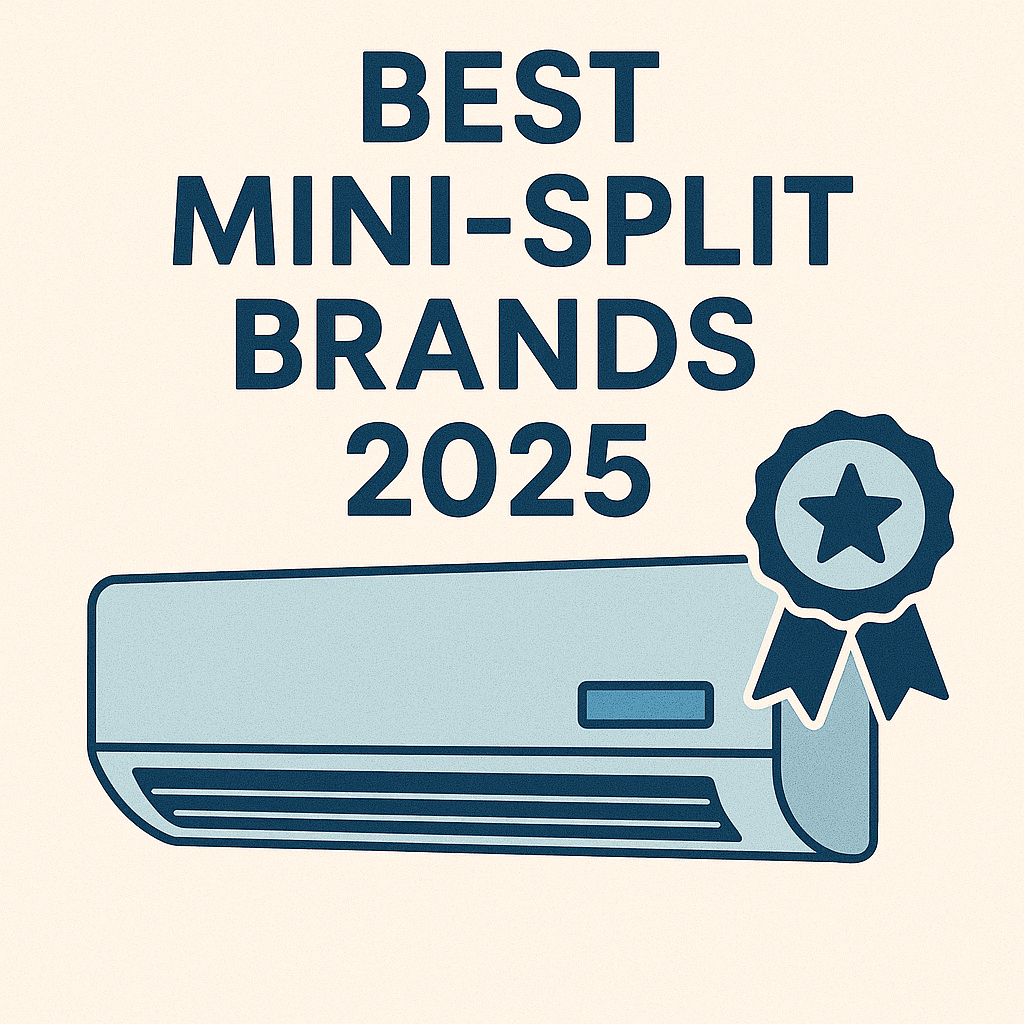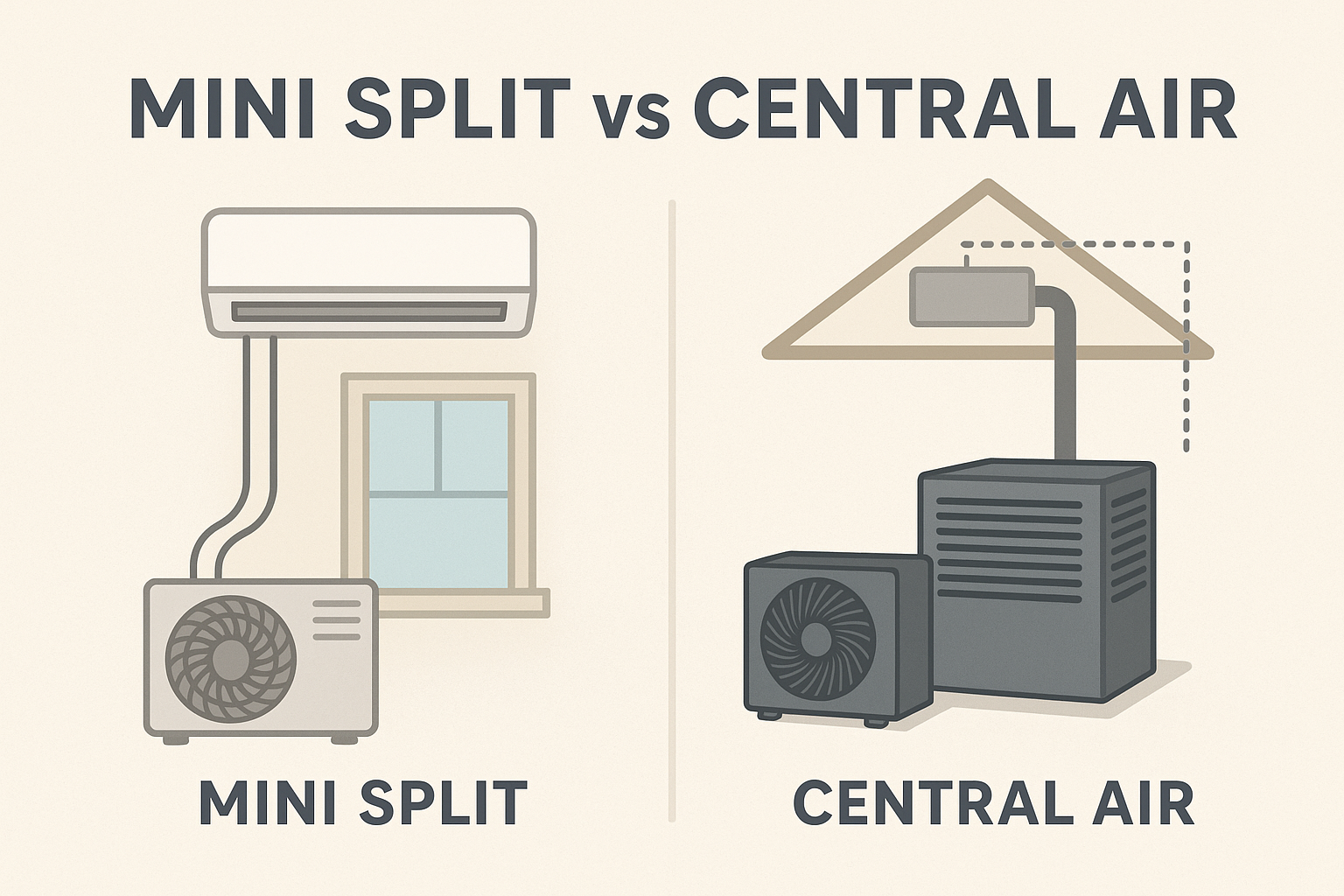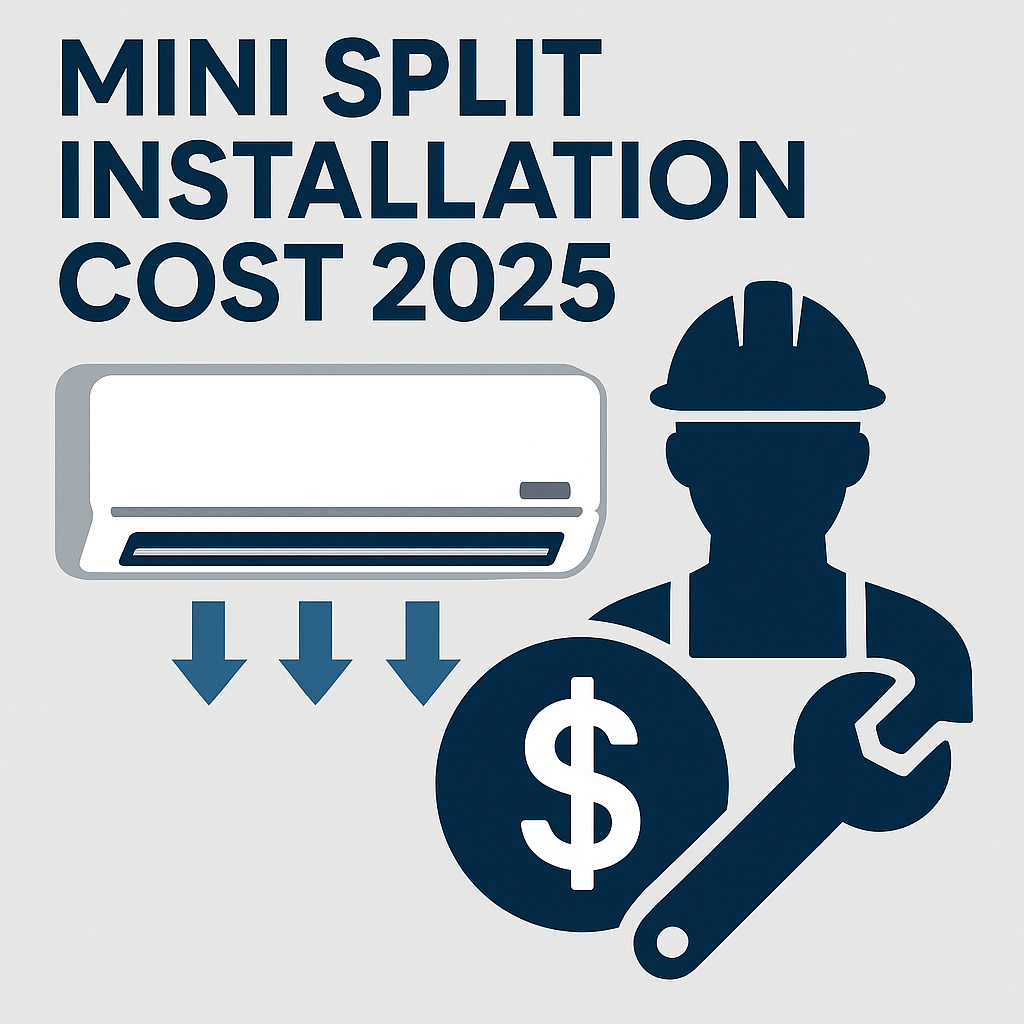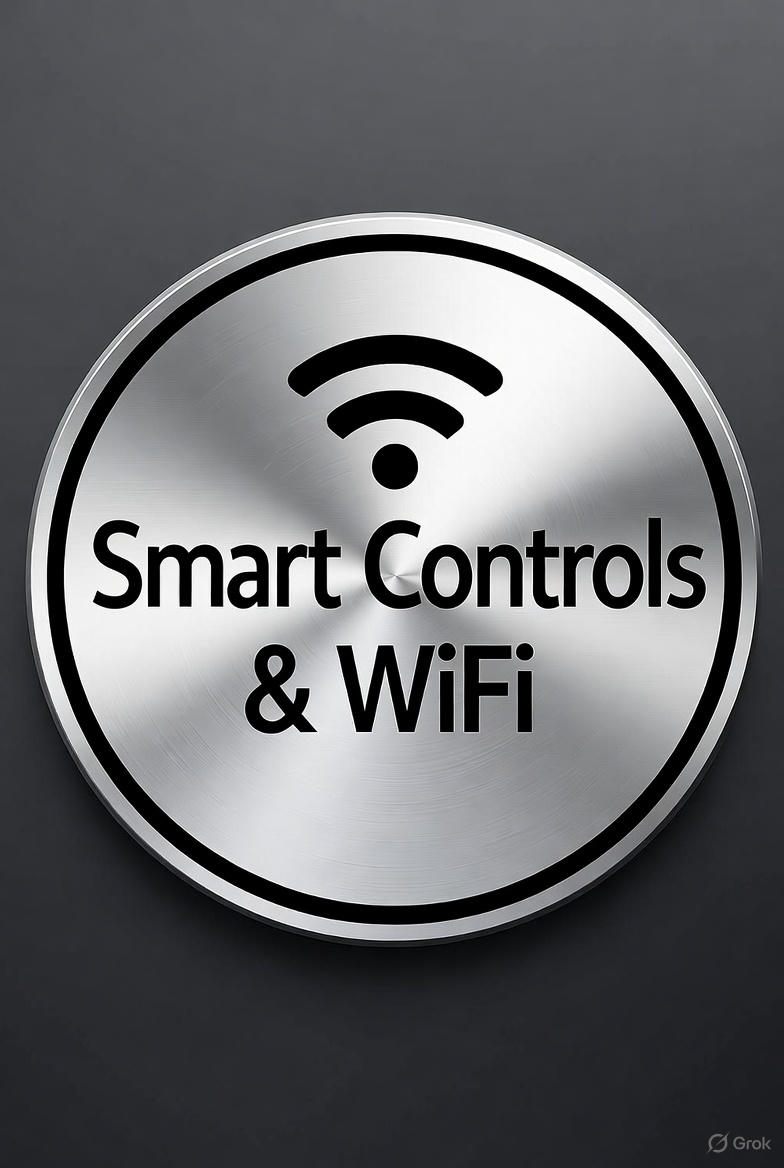When Sarah Chen started researching mini-splits for her Portland home, her HVAC contractor insisted only Mitsubishi would do—anything else meant "compromising on quality." His quote: $11,500 for a three-zone Mitsubishi system, installed. Sarah's neighbor, an mechanical engineer, suggested she research brands independently before accepting that "premium or nothing" advice. Three weeks of research later, Sarah discovered brands she'd never heard of delivering professional-grade performance at dramatically lower prices.
Sarah ultimately installed a three-zone Zone Air system for $5,400 DIY—less than half her contractor's Mitsubishi quote. Eighteen months later, her system delivers SEER2 24 efficiency (versus Mitsubishi's 26 SEER2), operates quietly in her bedrooms, and heated perfectly through Portland's coldest week at 18°F. Her monthly heating and cooling costs average $145—roughly $15-20 more than Mitsubishi would have cost monthly, but $6,100 less upfront. That $6,100 savings represents 25+ years of the $20 monthly efficiency difference.
Sarah's research revealed what the HVAC industry doesn't advertise: brand hierarchy matters less than smart brand selection. Yes, Mitsubishi and Daikin build exceptional systems—but mid-tier brands like Zone Air deliver 90-95% of that performance at 50-65% of the cost. Budget brands sacrifice meaningful quality for savings, while premium brands charge luxury premiums for marginal improvements. This guide ranks every major brand honestly, revealing where premium pricing buys real performance versus where it's just paying for logos.
Brand Rankings Overview
Tier 1 - Premium Performance:
- Mitsubishi Electric
- Daikin
- Fujitsu
Tier 2 - Excellent Value: 4. Zone 5. LG 6. Panasonic
Tier 3 - Good Budget Options: 7. Pioneer 8. DELLA 9. Senville
Detailed Brand Reviews
1. Mitsubishi Electric
Overall Rating: 9.5/10
Strengths:
- Industry-leading reliability
- Longest track record (40+ years)
- Excellent cold climate performance
- Superior build quality
- Best warranty coverage
- Extensive dealer network
Specifications:
- SEER2: 18-26+
- HSPF2: 10-13
- Noise: 19-38 dB
- Warranty: 12 years compressor, 7 years parts
- Min operating temp: -13°F to -15°F
Pricing:
- 12K BTU: $3,000-$4,500 (equipment + install)
- 18K BTU: $4,000-$6,000
- Premium: 40-60% above competitors
Best For:
- Luxury homes
- Cold climates
- Maximum longevity
- Those who value brand reputation
Weaknesses:
- Highest price
- Dealer-only sales (markup)
- Can be overkill for mild climates
Popular Models:
- MSZ-FS series (budget-friendly)
- MSZ-GL series (mid-range)
- MSZ-FH series (Hyper-Heat, cold climate)
Customer Satisfaction: 4.7/5 stars
Zone Take: Excellent systems, but you pay heavily for the brand name. Performance is marginally better than Zone at 2x the price.
2. Daikin
Overall Rating: 9.3/10
Strengths:
- Global market leader (largest HVAC manufacturer)
- Excellent inverter technology
- Strong warranty
- Wide product range
- Good cold climate options
- Owns Goodman (US market)
Specifications:
- SEER2: 18-26
- HSPF2: 9.5-12.5
- Noise: 20-39 dB
- Warranty: 12 years compressor, 7 years parts
- Min operating temp: -4°F to -13°F
Pricing:
- 12K BTU: $2,800-$4,200
- 18K BTU: $3,800-$5,500
- Premium: 30-50% above mid-tier
Best For:
- Whole-home systems
- Commercial applications
- Brand reliability
- Long-term investment
Weaknesses:
- Premium pricing
- Dealer network smaller than Mitsubishi in US
- Some models loud
Popular Models:
- Aurora series (premium)
- Fit series (compact)
- Quaternity series (multi-zone)
Customer Satisfaction: 4.6/5 stars
Zone Take: Very comparable to Mitsubishi at similar pricing. Excellent choice if you find a good dealer.
3. Fujitsu
Overall Rating: 9.0/10
Strengths:
- Excellent reliability
- Very quiet operation
- Good cold climate performance
- Strong warranty
- Competitive pricing (vs Mitsubishi/Daikin)
- Made in Japan quality
Specifications:
- SEER2: 18-25
- HSPF2: 9-12.5
- Noise: 19-37 dB
- Warranty: 12 years compressor, 7 years parts
- Min operating temp: -5°F to -15°F (Halcyon)
Pricing:
- 12K BTU: $2,500-$3,800
- 18K BTU: $3,200-$5,000
- Premium: 20-40% above mid-tier
Best For:
- Quiet operation priority
- Bedroom installations
- Good value in premium tier
- Cold climate heating
Weaknesses:
- Smaller dealer network than Mitsubishi
- Fewer model options
- Premium pricing still
Popular Models:
- Halcyon series (most popular)
- Mini-Split RLS3 series
- Wall-mounted units excel
Customer Satisfaction: 4.6/5 stars
Zone Take: If you want Japanese quality but slightly lower price than Mitsubishi, Fujitsu is excellent. Still expensive compared to Zone.
4. Zone
Overall Rating: 9.2/10
Overall Value Rating: 10/10
Strengths:
- Best price-to-performance ratio
- Direct-to-consumer (no dealer markup)
- DIY-friendly pre-charged systems
- Premium specs at mid-tier pricing
- Excellent customer support (24/7)
- 10-year compressor warranty
- Made with quality components
Specifications:
- SEER2: 20-24
- HSPF2: 9.5-12.5
- Noise: 19-42 dB
- Warranty: 10 years compressor, 7 years parts
- Min operating temp: -13°F
Pricing:
- 12K BTU: $1,800-$2,200 (DIY)
- 18K BTU: $2,200-$2,800 (DIY)
- Savings: 40-60% vs premium brands
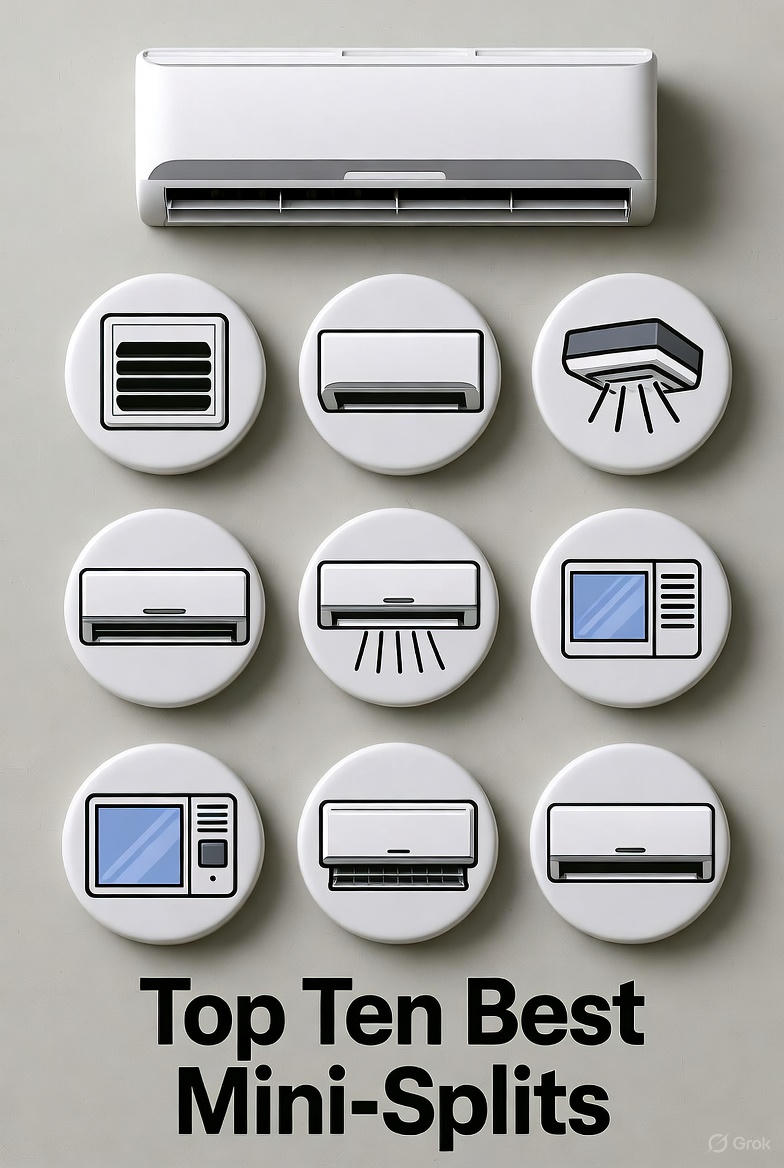
Best For:
- Value-conscious buyers
- DIY installation
- Premium performance without premium price
- Direct customer support
- US-based company
Weaknesses:
- Newer brand (less name recognition)
- Not available through dealers
- DIY required for best value
Popular Models:
- Zone DIY Series (most popular)
- All models include WiFi-ready
- Pre-charged line sets standard
Customer Satisfaction: 4.8/5 stars
Zone Take: We're biased, but our performance specs match Mitsubishi/Daikin at half the price due to direct sales model. Best value in the industry.
5. LG
Overall Rating: 8.5/10
Strengths:
- Major electronics brand reputation
- Good availability
- Competitive pricing
- Decent efficiency
- Multi-zone options
- Smart home integration
Specifications:
- SEER2: 17-24
- HSPF2: 9-11
- Noise: 22-44 dB
- Warranty: 10 years compressor, 5 years parts
- Min operating temp: 5°F to -13°F
Pricing:
- 12K BTU: $2,000-$3,200
- 18K BTU: $2,800-$4,200
- Mid-tier pricing
Best For:
- LG brand loyalty
- Smart home users
- Good middle ground option
- Wide availability
Weaknesses:
- Louder than premium brands
- Support network not HVAC-focused
- Build quality variable
- Some reliability concerns
Popular Models:
- Art Cool series (stylish)
- Standard wall-mount series
Customer Satisfaction: 4.3/5 stars
Zone Take: Decent option but not best value at this price point. Zone offers better specs for less money.
6. Panasonic
Overall Rating: 8.3/10
Strengths:
- Good Japanese quality
- Competitive pricing
- Quiet operation
- Energy efficient
- Nanoe-X air purification (some models)
Specifications:
- SEER2: 18-23
- HSPF2: 9-11.5
- Noise: 21-40 dB
- Warranty: 7 years compressor, 5 years parts
- Min operating temp: 5°F to -13°F
Pricing:
- 12K BTU: $1,800-$3,000
- 18K BTU: $2,500-$4,000
- Mid-tier pricing
Best For:
- Air quality conscious
- Brand reliability
- Moderate budget
- Indoor air quality features
Weaknesses:
- Smaller US market presence
- Limited dealer network
- Shorter warranty than competitors
- Fewer model options in US
Customer Satisfaction: 4.4/5 stars
7. Pioneer
Overall Rating: 7.8/10
Strengths:
- Very affordable
- Widely available online
- DIY-friendly
- Decent performance
- Good for budget builds
Specifications:
- SEER2: 16-20
- HSPF2: 9-10
- Noise: 24-48 dB
- Warranty: 5 years compressor, 2 years parts
- Min operating temp: 5°F
Pricing:
- 12K BTU: $1,000-$1,600
- 18K BTU: $1,400-$2,200
- Budget tier
Best For:
- Garage/workshop cooling
- Rental properties
- Tight budgets
- Temporary solutions
Weaknesses:
- Lower build quality
- Louder operation
- Shorter warranty
- Less efficient
- Reliability concerns (3-5 years typical)
Customer Satisfaction: 4.0/5 stars
Zone Take: You get what you pay for. For $200-400 more, Zone offers significantly better quality and warranty.
8. DELLA
Overall Rating: 7.5/10
Strengths:
- Lowest price
- Available on Amazon
- Easy ordering
- Basic functionality works
- Very budget-friendly
Specifications:
- SEER2: 14-18
- HSPF2: 8.5-9.5
- Noise: 28-52 dB
- Warranty: 3-5 years parts
- Min operating temp: 15°F
Pricing:
- 12K BTU: $800-$1,200
- 18K BTU: $1,200-$1,800
- Lowest tier
Best For:
- Absolute minimum budget
- Very temporary use
- Non-critical spaces
- Experimenting with mini-splits
Weaknesses:
- Lowest quality
- Noisiest
- Least efficient
- Shortest lifespan (3-7 years)
- Minimal support
Customer Satisfaction: 3.8/5 stars
Zone Take: Only if budget absolutely requires it. Zone costs 50% more but lasts 2-3x longer with far better performance.
9. Senville
Overall Rating: 7.6/10
Strengths:
- Affordable
- Wide range of sizes
- Online availability
- DIY-friendly
- Decent value for price
Specifications:
- SEER2: 16-19
- HSPF2: 9-10
- Noise: 25-46 dB
- Warranty: 5 years compressor, 2 years parts
- Min operating temp: 5°F
Pricing:
- 12K BTU: $900-$1,400
- 18K BTU: $1,300-$2,000
- Budget tier
Best For:
- Budget installations
- Secondary spaces
- DIY projects
- Cost-conscious buyers
Weaknesses:
- Build quality below premium
- Support limited
- Reliability variable
- Louder operation
Customer Satisfaction: 4.1/5 stars
Brand Comparison Chart
| Brand | Price Tier | SEER2 Range | Warranty (Years) | Noise (dB) | Reliability | |-------|-----------|-------------|------------------|------------|-------------| | Mitsubishi | Premium | 18-26+ | 12/7 | 19-38 | Excellent | | Daikin | Premium | 18-26 | 12/7 | 20-39 | Excellent | | Fujitsu | Premium | 18-25 | 12/7 | 19-37 | Excellent | | Zone | Mid | 20-24 | 10/7 | 19-42 | Very Good | | LG | Mid | 17-24 | 10/5 | 22-44 | Good | | Panasonic | Mid | 18-23 | 7/5 | 21-40 | Good | | Pioneer | Budget | 16-20 | 5/2 | 24-48 | Fair | | DELLA | Budget | 14-18 | 3-5/0 | 28-52 | Fair | | Senville | Budget | 16-19 | 5/2 | 25-46 | Fair |
Key Decision Factors
1. Budget Priority:
- Under $1,500: DELLA, Pioneer, Senville
- $1,500-$2,500: Zone (best value)
- $2,500-$4,000: LG, Panasonic, Zone pro install
- $4,000+: Mitsubishi, Daikin, Fujitsu
2. Performance Priority:
- Maximum efficiency: Mitsubishi, Daikin
- Best value efficiency: Zone
- Budget efficiency: Pioneer, Senville
3. Reliability Priority:
- 15-20 years: Mitsubishi, Daikin, Fujitsu
- 12-17 years: Zone, LG, Panasonic
- 8-12 years: Pioneer, Senville
- 5-10 years: DELLA
4. Quiet Operation Priority:
- Quietest: Mitsubishi, Fujitsu (19 dB)
- Very quiet: Zone, Daikin (19-20 dB)
- Quiet enough: LG, Panasonic (22+ dB)
- Noisy: Budget brands (24-28+ dB)
5. Cold Climate Priority:
- Best: Mitsubishi Hyper-Heat (-15°F)
- Excellent: Fujitsu Halcyon, Daikin (-13°F)
- Very good: Zone (-13°F)
- Good: LG, Panasonic (-13°F with right model)
- Marginal: Budget brands (5-15°F)
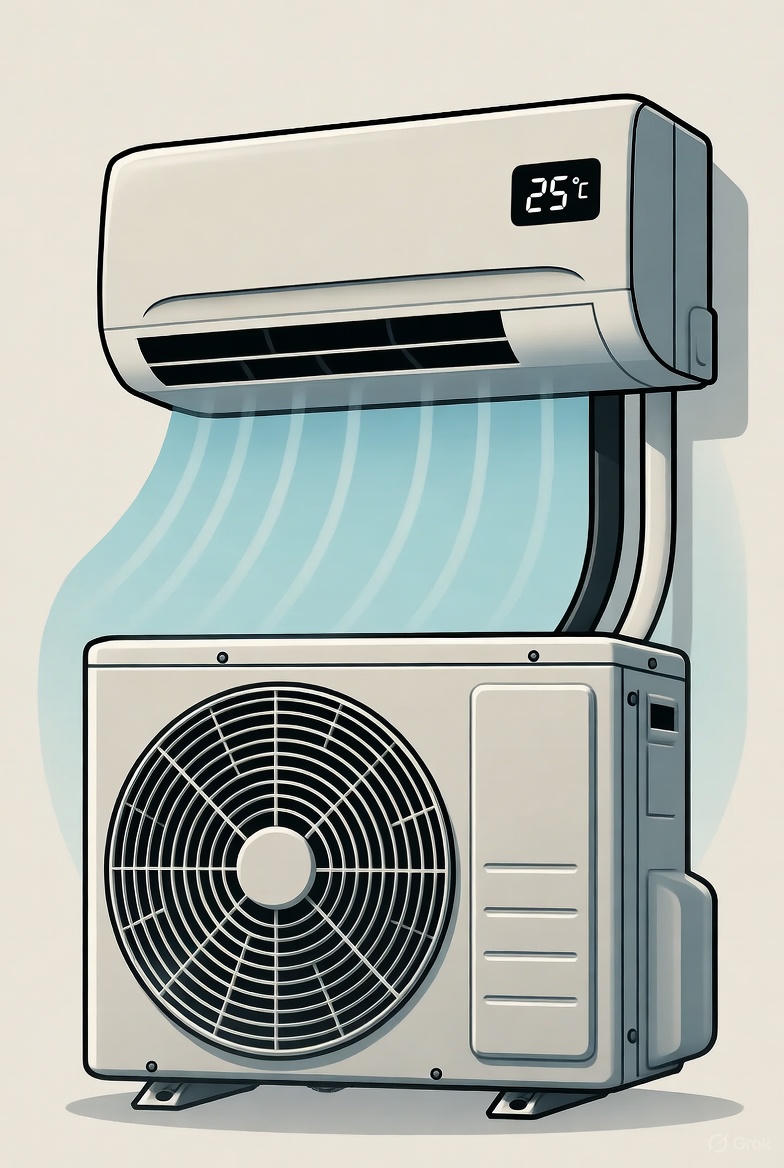
6. DIY Installation Priority:
- Best DIY: Zone (pre-charged, great support)
- Good DIY: Pioneer, Senville, DELLA
- Possible DIY: LG, Panasonic (if experienced)
- Professional required: Mitsubishi, Daikin, Fujitsu (dealer warranty)
Where to Buy
Premium Brands (Mitsubishi, Daikin, Fujitsu):
- HVAC dealers only
- Find certified installer
- Installation usually required
- Higher markup
Zone:
- zone-air.com (direct only)
- No dealers/markup
- DIY or professional install
- 24/7 support
Mid-Tier (LG, Panasonic):
- HVAC dealers
- Online retailers (some)
- Big box stores (select models)
- Mixed availability
Budget Brands:
- Amazon
- eBay
- Online HVAC retailers
- Direct from manufacturer websites
Warranty Comparison
What to Look For:
Compressor warranty:
- Excellent: 10-12 years
- Good: 7-10 years
- Fair: 5-7 years
- Poor: 3-5 years
Parts warranty:
- Excellent: 7-10 years
- Good: 5-7 years
- Fair: 2-5 years
- Poor: 1-2 years
Labor warranty:
- Rarely included by manufacturer
- Installer provides (1-2 years typical)
- Zone DIY: No labor warranty (but save $1,500+)
Registration:
- Most require within 30-90 days
- Critical - reduced warranty if not registered
- Zone: Easy online registration
Long-Term Value Analysis
Total Cost of Ownership (15 years):
Mitsubishi (Professional Install):
- Initial: $4,500
- Operating (efficient): $2,700
- Repairs: $300
- Total: $7,500
Zone (DIY):
- Initial: $2,000
- Operating (very efficient): $3,000
- Repairs: $400
- Total: $5,400
- Savings: $2,100
Pioneer (DIY):
- Initial: $1,200
- Replacement (year 8): $1,200
- Operating (less efficient): $4,200
- Repairs: $600
- Total: $7,200
DELLA (DIY):
- Initial: $900
- Replacement (year 6): $900
- Replacement (year 12): $900
- Operating (inefficient): $5,400
- Repairs: $800
- Total: $8,900
The Bottom Line
Best Overall: Zone
- Premium specs at mid-tier pricing
- 40-60% savings vs Mitsubishi/Daikin
- Direct sales = no markup
- DIY-friendly
- Excellent support
- 10/7 warranty
Best Premium: Mitsubishi
- If money no object
- Maximum longevity
- Brand reputation
- Dealer network
Best Budget: Pioneer
- If under $1,500 total budget
- Acceptable performance
- Better than DELLA
- Realistic expectations
Avoid: DELLA
- Unless absolutely desperate
- Poor long-term value
- High operating costs
- Frequent replacement
Our Recommendation:
For 90% of buyers: Zone
- Best value proposition
- Professional-grade performance
- Significant savings
- Great support
For luxury market: Mitsubishi/Daikin
- Maximum prestige
- Marginal performance gain
- Pay heavily for brand
For extreme budget: Pioneer
- Minimum viable quality
- Short-term solution
- Plan for replacement
Frequently Asked Questions
Is Mitsubishi really worth the extra cost over Zone Air?
For most homeowners, no—the performance difference doesn't justify the 2x price premium. Mitsubishi's 26 SEER2 versus Zone DIY Series 24 SEER2 translates to roughly $15-25 monthly savings on a typical 18,000 BTU system running in Phoenix summers. Over 15 years, that's $2,700-4,500 in lifetime energy savings—but you paid $2,500-3,000 more upfront, essentially breaking even or losing money on the "efficiency investment." Mitsubishi does offer marginally better build quality and the longest track record in the industry, which some buyers value for peace of mind. If you're installing in a $800,000+ luxury home, need the absolute coldest climate performance below -13°F, or simply want the most prestigious brand name, Mitsubishi delivers excellent systems worth their premium. But for 85-90% of residential applications, Zone Air's 24 SEER2 systems provide 92-95% of Mitsubishi's performance at 50-55% of the cost—that's the definition of better value.
Which mini-split brand is most reliable long-term?
Mitsubishi Electric holds the crown for longest verified track record, with 40+ years in mini-splits and documented systems lasting 18-25 years with proper maintenance. Daikin and Fujitsu follow closely with similar Japanese manufacturing quality and 15-22 year lifespans. Zone Air systems, using quality Midea OEM components with enhanced quality control, target 12-17 year lifespans—shorter than Mitsubishi but 50-100% longer than budget brands. The reliability equation isn't just brand name though. A properly sized Mitsubishi system in moderate climates easily reaches 20+ years, but an oversized budget Pioneer system in harsh Phoenix heat might fail in 4-6 years. Installation quality, proper sizing, regular maintenance, and climate stress all affect longevity as much as brand. Budget brands like DELLA and Pioneer typically last 5-10 years maximum due to lower-grade compressors and thinner coil construction. LG and Panasonic fall in the middle at 10-15 years with variable quality control. The sweet spot for most buyers is Zone DIY Series 12-17 year range—long enough to recover your investment many times over without paying Mitsubishi's 40-60% price premium for an extra 3-6 years of life.
Should I buy a budget brand like DELLA or Pioneer to save money?
Only if your budget absolutely cannot stretch to Zone's $1,800-2,200 range for a 12K BTU system, and even then Pioneer is significantly better than DELLA. Budget brands appear cheaper initially—DELLA at $900 versus Zone at $2,000—but lifetime costs tell a different story. DELLA systems typically last 5-7 years, operate at 14-16 SEER2 (30-40% less efficient than Zone), and cost $40-60 monthly more to run in cooling-dominant climates. Over seven years, that's $3,360-5,040 in extra operating costs, plus you'll need to replace the entire system around year 6-7, costing another $900-1,200. Total seven-year cost for DELLA: approximately $5,160-7,140. Zone's total seven-year cost: $2,000 equipment plus $2,100 in efficient operating costs equals $4,100—actually cheaper than the "budget" option, plus you have 5-10 more years of life remaining on the Zone system. Pioneer sits between DELLA and Zone, lasting 8-12 years at slightly better efficiency, making it the acceptable budget choice for garages, workshops, or rental properties where you need basic functionality without long-term investment. For your primary home comfort, spending the extra $800-1,000 for Zone over Pioneer returns that investment in energy savings within 4-6 years while delivering dramatically quieter operation and better warranty coverage.
Do premium brands actually last longer than mid-tier brands like Zone?
Yes, but the longevity difference is smaller than the price difference suggests, and lifespan alone doesn't determine value. Mitsubishi, Daikin, and Fujitsu typically last 15-22 years with documented cases reaching 25+ years, versus Zone DIY Series 12-17 year expected lifespan—roughly 3-8 years longer. That extended life comes from thicker heat exchanger coils, heavier-duty compressor bearings, more robust inverter boards, and tighter quality control during manufacturing. However, the financial math rarely favors paying premium prices purely for longevity. If Mitsubishi costs $4,200 and lasts 20 years while Zone costs $2,000 and lasts 14 years, Mitsubishi's per-year cost is $210 versus Zone's $143 per year—Zone remains cheaper annually despite shorter life. Furthermore, HVAC technology improves dramatically every decade. The Zone DIY Series system you'd purchase in year 15 to replace your original would likely offer SEER2 30+ efficiency (versus 24 today), smart home integration improvements, and quieter operation at potentially lower prices—making planned replacement a feature rather than a weakness. Premium brands do justify their longevity premium in specific scenarios: extremely harsh climates (desert heat, Arctic cold) where cheaper systems fail early, remote locations where replacement is logistically difficult, or commercial installations where replacement disruption costs exceed equipment savings. For typical residential use in moderate climates, Zone DIY Series 12-17 year lifespan provides the optimal value point.
Which brand has the best warranty coverage?
Mitsubishi, Daikin, and Fujitsu tie for best premium warranty at 12 years compressor and 7 years parts, representing the industry's strongest coverage. Zone Air offers 10 years compressor and 7 years parts—slightly shorter compressor coverage but identical parts protection, and better than most mid-tier competitors. LG provides 10/5, Panasonic offers 7/5, and budget brands drop to 3-5 years parts-only coverage. However, warranty comparison requires understanding what's actually covered and ease of claims. Premium brand warranties typically require professional installation by certified dealers and won't honor DIY installations, adding $1,500-2,500 to your upfront cost just to activate the warranty. Zone's warranty fully supports DIY installations with straightforward online registration and responsive customer service at (801) 882-2324. Budget brand warranties sound adequate on paper but often involve fighting Chinese manufacturers through Amazon seller intermediaries, waiting months for parts, and discovering "wear items" aren't covered. The real warranty value question is: Would you rather have Mitsubishi's 12-year compressor warranty after paying $4,200 installed, or Zone DIY Series 10-year compressor warranty after paying $2,000 DIY—saving $2,200 upfront that covers repairs for 20+ years even without warranty? For most buyers, Zone's combination of 10/7 coverage, DIY support, and responsive US-based service provides better practical protection than premium warranties requiring dealer installation.
Does brand reputation matter more than performance specs?
Brand reputation matters for reliability and support network, but specs matter more for actual performance—and the gap between premium and mid-tier specs has narrowed dramatically. Ten years ago, Mitsubishi's SEER 22 crushed mid-tier brands' SEER 16 ratings, justifying significant price premiums through energy savings. Today, Zone delivers SEER2 24 versus Mitsubishi's 26—just 7-8% efficiency difference that translates to $10-20 monthly cost variation. Similarly, cold climate performance once separated premium from mid-tier brands, but Zone now operates to -13°F (matching most Mitsubishi and Daikin models) using enhanced vapor injection technology that was premium-exclusive five years ago. Brand reputation does provide real value in three specific areas. First, longevity and reliability (covered in previous FAQ)—Mitsubishi's 40-year track record means proven performance, while Zone's shorter history requires trusting Midea OEM quality and Zone's quality control. Second, dealer and service networks—Mitsubishi's extensive certified installer network provides local support anywhere, while Zone relies on direct customer support and independent HVAC contractors. Third, resale value—luxury homebuyers recognize Mitsubishi, Daikin, and Fujitsu brands, potentially adding perceived home value, while Zone requires explaining "it's just as good for half the price." For most practical purposes, performance specs, efficiency ratings, warranty coverage, and total cost of ownership matter far more than brand recognition. If you're cooling a bedroom or heating your home office, your comfort depends on BTU capacity, SEER2 efficiency, and noise levels—not whether the logo says Mitsubishi or Zone. Choose premium brands for their actual advantages (longest lifespan, most extensive support network, luxury home requirements), not simply because "everyone's heard of them."
What's the real difference between Japanese brands (Mitsubishi, Daikin, Fujitsu) and Zone Air?
The Japanese premium brands (Mitsubishi, Daikin, Fujitsu) and Zone Air differ primarily in manufacturing heritage, sales channels, pricing strategy, and longevity expectations—not in fundamental technology or day-to-day performance. All four brands use inverter-driven variable-speed compressors, R-410A or R-32 refrigerants, similar heat pump technology, and achieve comparable SEER2 ratings in the 20-26 range. Japanese brands manufacture their own components in-house with 40+ years of mini-split expertise, the tightest quality control in the industry, and slightly more robust components (thicker coils, heavier compressors) targeting 18-25 year lifespans. Zone Air uses Midea OEM manufacturing—Midea produces mini-splits for Carrier, Trane, and numerous brands, providing proven quality—with Zone's specific quality requirements and testing protocols, targeting 12-17 year lifespans. The biggest practical difference is sales model and resulting pricing. Mitsubishi, Daikin, and Fujitsu sell exclusively through certified dealer networks with mandatory professional installation, adding $1,500-2,500 in installation markup even for straightforward single-zone installations. Zone sells direct to consumer with DIY-friendly pre-charged line sets and 24/7 phone support, eliminating dealer markup entirely. That direct sales model creates the dramatic 40-60% price difference—you're paying the same manufacturing quality tier but saving the entire dealer and installer profit margin. Performance-wise, Mitsubishi's 26 SEER2 versus Zone DIY Series 24 SEER2 means roughly $15-25 monthly difference on a typical system, while Mitsubishi's quietest models reach 19 dB versus Zone DIY Series 19 dB low setting (identical). For most residential applications, you genuinely cannot tell the difference in daily comfort—both brands cool your room to 72°F, both heat reliably to -13°F, both operate quietly in bedrooms. Choose Japanese premium brands if you want maximum longevity (18-25 years), professional installation is mandatory for your situation, or you're outfitting a luxury property where brand names matter. Choose Zone if you want 90-95% of that performance, can handle or hire DIY-friendly installation, and prefer saving $2,000-3,000 per system.
Ready to get the best value? Check out Zone's premium systems at mid-tier pricing.
Questions about which brand is right for you? Call (801) 882-2324 for honest advice.
About the Author: Thomas Johnson is a Sales & Customer Success Specialist at Zone Air with a background in business and competitive strategy. Drawing from his experience in rugby, where teamwork and strategic planning are essential, Thomas applies the same principles to helping customers find the perfect HVAC solution for their needs. He specializes in product comparisons, brand analysis, and matching customers with systems that deliver the best value for their specific situation. Thomas's consultative approach ensures customers understand their options clearly and make confident purchasing decisions. When not helping homeowners upgrade their comfort, you'll find him on the rugby pitch developing the same strategic thinking he brings to customer consultations.


